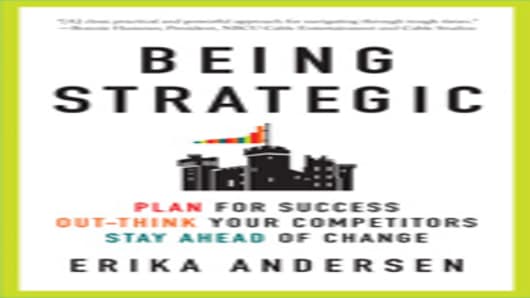Guest Author Blog: Erika Andersen, author of BEING STRATEGIC.
Most people have, at some point their lives, lost their job.
Fired, downsized, laid off, the company’s gone bust– whatever the reason, it’s inevitably a shock. And at this particular moment in time, it’s happening to us in record numbers.
I’ve talked to a few people who have lost their jobs recently. They say that knowing there are lots of people in the same boat makes it both a little easier – “I’m not the only one; it’s not my fault” – and harder – “So many people out of work - so much competition for whatever jobs are out there.”
But the real question is – what now?
If you’ve lost your job, what’s the best next step?
We all have deeply wired-in fear responses that are designed to kick in when we feel threatened – psychologists label them fight, flight and freeze. And losing your job can catalyze any or all of them: fight – a panicky and over-zealous focus on finding a job – any job – as soon as possible; flight – a total and obsessive focus on anything BUT finding a job; and freeze – staying in your apartment with a pint of ice cream, in your jammys with the TV turned way up.
Take a deep breath.
The most useful way to deal with this very difficult situation is to take one giant mental step back from it. First, look at your current reality with the clear eye of a scientist (I know this is hard, but bear with me). What do you actually have to going for you? Look both within you (your skills, experience and knowledge, for instance, or your charming personality) and around you (e.g., your human network, both professionally and personally, any available financial resources).
Now – and this is harder to do without giving in to fear, but it must be done: look clear-eyed at the negatives in your current reality. Are you most skilled or experienced in a field or industry that’s really tanking? Is your financial safety net thin? Acknowledge it all…don’t let it paralyze you, but acknowledge it nonetheless.
Once you feel as though you have a pretty objective and accurate picture of your situation – both the good news and the bad news – look to the future.
This is perhaps even more difficult – fear tends to close down our mental and emotional aperture, so that we can’t see possibilities, but only threats. One way to get around your own fear is to literally imagine yourself in a successful future. You might want to say to yourself, “A year from now, having leveraged my strengths and assets and overcome the obstacles, I’ll be….” Ignore, for the moment, the frantic voice in your head that’s yelling “Not possible, not possible!” – and just focus on seeing it.
Then say it out loud to yourself.
There’s great power in this, in declaring an intention…and it’s not just woo-woo new age stuff; research shows that people who state their goals are significantly more likely to achieve them.
You might be surprised at what comes out of you.
It could be something as simple as “I have a job I like and am good at, that supports me comfortably,” or it could be something like, “I’m teaching 8th grade at a private school – something I’ve always wanted to do,” or “I found a job managing a research and development group in a large company…which, as it turns out, I’m really good at.”
"Fear tends to close down our mental and emotional aperture, so that we can’t see possibilities, but only threats."
Having a vision is a wonderful thing.
It focuses your attention; it catalyzes hope. Then you can start working toward it, and fear tends to take a back seat, almost magically. Especially when you’re clear about where you’re starting from – then you can determine and take the practical steps that will move you from where you are now to where you want to go.
With both your starting point and your goal clearly in mind, you can make some core directional choices – select some strategies – that will best take you there. And you can balance those choices that will provide a practical foundation (minimizing your expenditures, deciding to find interim work) with those that will move you toward the future you want to create for yourself (clarifying the work you want to do, figuring out how to position or educate yourself, deciding how to take best advantage of your friends’ and colleagues’ connections). Once you’ve made these directional choices, it’s then much easier to decide the specific actions – the tactics – you’ll need to take to make them happen.
And – I’ve experienced this myself, in tough times – once you start moving toward one thing, it may well be that other, even more interesting opportunities will arise. If you put up your sail to catch the wind you’re looking for – it makes you available to other winds, as well.
And if that “not possible!” voice in your head starts yammering again, say this: “I know where I am, I know where I want to go – and I have a plan to get there. Back off.” Trust me, it will work much better than Haagen Dazs.
Erika Andersen is the author of BEING STRATEGIC.
She is also the founding partner of Proteus International, a coaching, consulting and training firm and has served as coach and advisor to the senior executives of such companies as MTV Networks, GE, Rockwell Automation, Union Square Hospitality Group, and Cablevision Corporation.
For more, check out the author's website: www.proteus-international.com and her blog at erikaandersen.com
Do you have a book suggestion, question or comment for Bullish? bullishonbooks@cnbc.com




